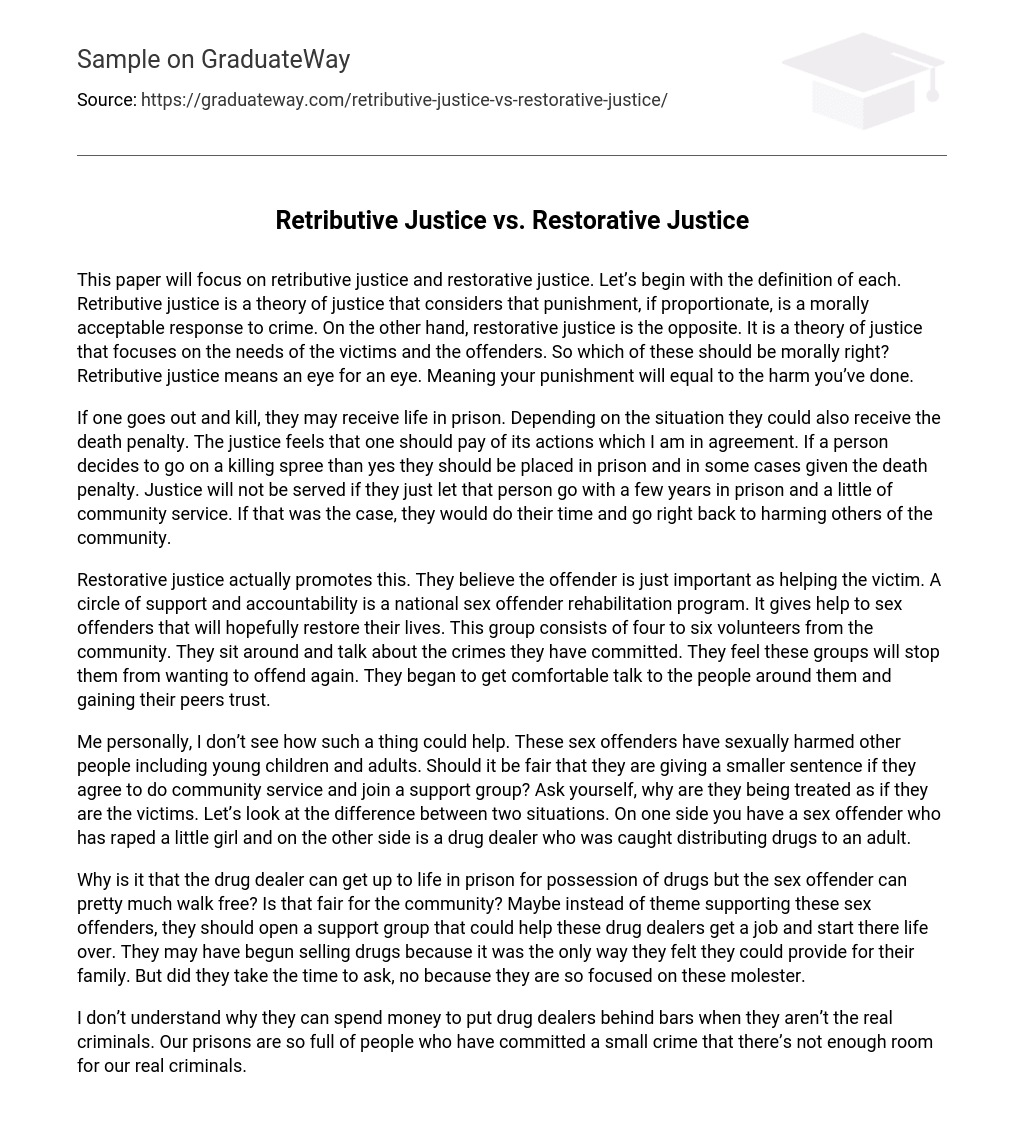This paper investigates the ethical implications of retributive justice and restorative justice. Retributive justice supports the idea of proportional punishment for a committed crime, which is widely seen as morally acceptable. On the other hand, restorative justice seeks to address the needs of both victims and offenders. The question arises regarding which approach is ethically justified. Retributive justice follows the principle of “an eye for an eye,” ensuring that punishment corresponds to the harm caused.
The justice system imposes harsh punishments, including life imprisonment or death penalty, on individuals who commit murder. I support the idea that people should be held accountable for their actions. If someone decides to engage in a string of murders, it is crucial that they are imprisoned and potentially executed. It would be unfair if these individuals were set free after serving a short prison term and completing community service. In such cases, they would merely serve their sentence only to reemerge as a threat to the community.
Restorative justice seeks to provide support for the victim and rehabilitation for the offender, exemplified by a nationwide program called a circle of support and accountability that targets sex offenders. The primary aim of this initiative is to assist these individuals in rebuilding their lives. To achieve this goal, group meetings are organized with four to six volunteers from the community who engage in conversations about the crimes committed by the offenders. These sessions strive to foster a sense of ease and confidence among participants, ultimately aiming to deter future offenses.
From my perspective, I do not understand the potential benefits of this approach. These individuals are categorized as sex offenders and have caused sexual harm to both children and adults. Is it fair for them to receive a shorter prison sentence if they participate in community service and join a support group? We need to think about why they are seen as victims themselves. Now, let’s compare two situations: one is a sex offender who raped a young girl, while the other is an adult drug dealer caught selling drugs.
Is it fair to the community if drug possession leads to a life sentence for a drug dealer while sex offenders frequently evade punishment? Rather than only addressing the issue of sexual offenders, support groups should be accessible for drug dealers to assist them in obtaining employment and rebuilding their lives. Selling drugs may have been their only method of providing for their families, but no one bothers to investigate their situation. The emphasis persists solely on these individuals who commit molestation.
The allocation of funds towards incarcerating drug dealers rather than targeting the true culprits perplexes me. Our correctional facilities are overcrowded with individuals who have committed minor transgressions, leaving minimal capacity for genuine criminals. We currently have incarcerated individuals for petty theft, engaging in physical altercations, and even failing to fulfill child support obligations, meanwhile allowing sexual offenders to evade punishment. In this particular scenario, I hold a dissenting viewpoint on the concept of restorative justice. There are five primary methods of punishment, with deterrence being the initial approach.
The text explores different strategies for dealing with crime. It proposes that individuals are less inclined to engage in criminal activities if they understand that there will be repercussions. The absence of consequences for bank robbery would result in a rise in such incidents. Another approach is rehabilitation, which allows criminals to learn from their errors and avoid repeat offenses, much like support groups. Moreover, punishment as a means of incapacitation keeps offenders away from society and guarantees public safety.
Imprisoning a serial killer prevents others from being harmed by the same individual. It is a form of punishment where the severity corresponds to the crime committed. For instance, stealing from a store would not result in a life sentence, but bombing a community and causing multiple fatalities could lead to the death penalty or life imprisonment. Another approach to punishment is vengeance.
Anger is similar to retribution, but differs in that it is emotional, personal, and seeks a more severe punishment for the offense. Instead of directing their anger towards the guilty party, individuals tend to unleash it on someone else. Consequently, can anger ever be justified? I believe not. If every case were driven by emotions, more individuals would unjustly face incarceration. Innocent people would be wrongly deemed guilty. Rather than considering evidence, the focus would be on how the situation made them feel. Therefore, anger should never be deemed appropriate.





